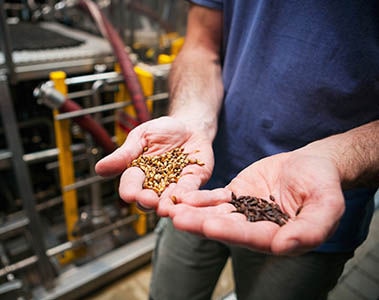
News
5月 5, 2022
酵素ソリューションの助けを借りて、より持続可能なグラスビールを造る

It’s no longer enough to talk about sustainability; the time has come to put words into action. In the brewing industry, some of the largest companies in the business are putting a firm stake in the ground and committing to ambitious planet targets. How achievable are they?
Driving change in any industry requires a critical mass of good intention and meaningful action. As climate change comes to the forefront of the public agenda, it’s clear that market success and long-term viability for any business will depend on building more sustainable operations. That’s because today’s conscious consumers are mindful of the environmental impact of the products they purchase, and the power they have to create a greener future through their choices.
It’s no longer enough to talk about sustainability; the time has come to put words into action. In the brewing industry, some of the largest companies in the business are putting a firm stake in the ground and committing to ambitious planet targets. How achievable are they?
Driving change in any industry requires a critical mass of good intention and meaningful action. As climate change comes to the forefront of the public agenda, it’s clear that market success and long-term viability for any business will depend on building more sustainable operations. That’s because today’s conscious consumers are mindful of the environmental impact of the products they purchase, and the power they have to create a greener future through their choices.
Brewing Industry sets bold targets as course for action
The brewing industry is taking note, and leading players are making clear commitments to embrace sustainability throughout their operations. Just recently, Diageo launched a 10-year sustainability action plan with ambitious targets that align to the United Nations Sustainable Development Goals (SDGs). Among their plan’s three focus areas is ‘pioneering grain-to-glass sustainability’, and the company is setting goals to achieve net zero carbon emissions from direct operations and to use 30% less water in every drink it produces by 20301. Carlsberg have also set ambitious science-based targets to reach ZERO emissions from their breweries by 2030, read in detail about their sustainability roadmap here.
ABInBev has similarly aligned to the SDGs and committed to its own 2025 Sustainability Goals that include getting 100% of purchased electricity from renewable sources2.
HEINEKEN announced its 2030 Brew a Better World programme, a set of ambitious commitments aimed at driving a positive impact on the environment, social sustainability and the responsible consumption of alcohol, as part of their efforts towards net zero carbon by 2030.

Innovative enzyme solutions put sustainability targets in reach
“The momentum within the brewing industry toward sustainable operations, and the commitment from many global breweries to take real action to get there, is both compelling and really exciting for all of us,” says Joana Carneiro, Business Director Beverages, dsm-firmenich Food Specialties.
“As a partner to breweries around the world, dsm-firmenich is responding in kind with a broadening portfolio of brewing enzymes that will help brewers produce a more sustainable glass of beer that tastes great and begs another sip.”
As an example, dsm-firmenich recently added Maxadjunct™ ß L, a high-performance adjunct brewing enzyme, to its enzyme portfolio. The choice of raw material can have a significant impact on overall efficiency, energy usage and cost. Thus, brewers invested in more sustainable production can increase the use of adjuncts, such as rice, maize and cassava, to help reduce the amount of malt in their recipes. The malting process for barley is quite energy- and water-intensive, so using less of it and increasing the ratio of adjuncts can have a big impact on reducing CO2 emissions.
Maxadjunct™ ß L gives brewers the flexibility to use a wide variety of raw materials (even up to 100% adjuncts) and deliver the same great-tasting beer. An added benefit is that adjuncts are often sourced locally, which further contributes to a circular economy in the region and a lower carbon footprint.

Results that make a difference
Enzymes are naturally sustainable, simple to use and can be added to different stages of brewers’ existing production processes, depending on the application and intended effect. Right now our Brewer’s Clarex® has been in the market for more than 10 years and is a proven technology with an average of 1 per 4 bottles in beer production being brewed with it to support a variety of sustainability targets globally . It’s a unique liquid enzyme added to the fermentation stage that streamlines beer stabilization by eliminating the deep cooling and rinsing step.

This reduced maturation time (by one day) can enable brewers to cut their carbon footprint by 5-6%, reduce water use by 1% and reach energy cost savings up to €70,000 per 1 million hectoliters of beer produced. In fact, if all the beer in Europe was made with Brewers Clarex®, the energy saved (327 KWH) would equal €30 million in cost savings and 52,000 fewer cars on the road for one year!
Brewers Clarex® and the rest of dsm-firmenich's portfolio of robust brewing enzymes is complemented by a highly skilled team of application experts, with years of experience helping breweries deliver sustainable, on-trend beverages to consumers.

It’s clear that sustainability is no longer a trend but a requirement – for doing business, for staying in business and for countering the impact of climate change. When businesses large and small get on board and make tangible commitments to ensure a greener future, as has happened in brewing, it creates opportunities for innovative solutions, like dsm-firmenich's portfolio of brewing enzymes, that will help enable this future.
もはや持続可能性を口にするだけでは十分ではなく、言葉を行動に移すべき時が来ている。 醸造業界では、業界最大手の企業が大地にしっかりと杭を打ち、野心的な地球規模の目標に取り組んでいる。 その達成可能性はどの程度なのだろうか?
気候変動が社会的課題の最前線に躍り出るなか、どのような企業にとっても、市場での成功と長期的な存続が、より持続可能な事業の構築にかかっていることは明らかだ。 意識の高い今日の消費者は、購入する製品が環境に与える影響に心を配り、その選択を通じてより環境に優しい未来を創造する力を持っているからだ。
醸造業界が行動指針として大胆な目標を設定
醸造業界はこれに注目し、大手各社は事業全体を通じて持続可能性を取り入れることを明確に約束している。つい最近、ディアジオ は、国連の持続可能な開発目標(SDGs)に沿った野心的な目標を掲げた10年間の持続可能性行動計画 を開始した。同社は計画の3つの重点分野のうち、「グレイン・トゥ・グラスの持続可能性の開拓」を掲げており、2030年までに直接事業からの二酸化炭素排出量を正味ゼロにし、製造するすべての飲料で水の使用量を30%削減するという目標を掲げている1 。 カールスバーグ はまた、2030年までに醸造所からの排出量をゼロにするという、科学に基づく野心的な目標を掲げている。持続可能性に関するロードマップの詳細はこちら 。
ABInBev も同様にSDGs と連携し、購入電力を100%再生可能エネルギーで賄うことを含む独自の2025年サステナビリティ目標2 にコミットしている。
ハイネケン(HEINEKEN) は、「2030 Brew a Better World」プログラム( )を発表した。これは、2030年までに純炭素ゼロを目指す取り組みの一環として、環境、社会の持続可能性、責任あるアルコール消費にプラスの影響を与えることを目的とした一連の野心的なコミットメントである。

革新的な酵素ソリューションにより、持続可能性目標に手が届く
DSMフードスペシャリティーズの飲料事業部長であるジョアナ・カルネイロは、「醸造業界における持続可能な事業への機運と、多くの世界的な醸造所が持続可能な事業に向けて実際に行動を起こすというコミットメントは、私たち全員にとって説得力があり、本当にエキサイティングなことです」と語る。
「世界中の醸造所のパートナーとして、DSMは醸造酵素の幅広いポートフォリオでそれに応えています。
その一例として、DSMは最近、高性能の補助醸造酵素であるMaxadjunct™ ß L を酵素ポートフォリオに加えました。原料の選択は、全体的な効率、エネルギー使用量、およびコストに大きな影響を与える可能性があります。したがって、より持続可能な生産に投資している醸造業者は、米、トウモロコシ、キャッサバなどの補助添加物の使用を増やすことで、レシピ内の麦芽の量を減らすことができます。大麦の製麦工程はエネルギーと水を非常に消費するため、大麦の使用量を減らし、補助添加物の割合を増やすことで、CO2排出量の削減に大きな影響を与えることができます。
Maxadjunct™ ß Lは、 (最大100%の添加剤まで)多様な原料を使用し、同じ味のビールを提供する柔軟性を醸造メーカーに提供します。さらに、添加剤は多くの場合地元で調達されるため、地域の循環型経済とカーボンフットプリントの削減にさらに貢献するという利点もあります。

違いを生む結果
酵素は自然に持続可能で、使い方が簡単で、用途や意図する効果に応じて、醸造業者の既存の製造工程のさまざまな段階に加えることができる。 現在、当社のBrewer's Clarex®は市場に出てから10年以上が経過しており、世界的にさまざまな持続可能性目標をサポートするために、ビール製造の平均4本に1本がこの酵素で醸造されている実績のある技術である。 これは発酵段階に加えるユニークな液体酵素で、深く冷却してすすぐステップを省くことでビールの安定化を合理化する。

この熟成時間の短縮(1日)により、ビールメーカーは二酸化炭素排出量を5~6%削減し、水の使用量を1%削減し、ビール生産量100万ヘクトリットルあたり最大7万ユーロのエネルギーコスト削減を達成することができる。 実際、ヨーロッパのすべてのビールがBrewers Clarex®で製造された場合、節約されたエネルギー(327KWH)はコスト削減で3,000万ユーロに相当し、1年間に走行する自動車は52,000台減少する!
Brewers Clarex®をはじめとするDSMの堅牢な醸造用酵素の製品ラインアップは、醸造所が持続可能でトレンドに合った飲料を消費者に提供するのを長年にわたって支援してきた経験を持つ、高度な技術を持つ応用専門家チームによって補完されている。
持続可能性はもはやトレンドではなく、ビジネスを行う上でも、ビジネスを継続する上でも、そして気候変動の影響に対抗する上でも、必要条件であることは明らかです。 醸造業で起こったように、大企業も中小企業も、より環境に優しい未来を確保するために具体的なコミットメントを行うことで、DSMの醸造用酵素のポートフォリオのような、この未来を実現するための革新的なソリューションの機会が生まれます。

Brew more beer with locally sourced raw materials

Brewers Compass® enables brewers to replace malt with locally available raw materials, such as barley or blends of wheat, maize, rice, sorghum and cassava. The barley malting process accounts for approximately 10 to15% of the eco-footprint of beer. Switching from malt to barley brewing allows a 10% reduction in barley consumption and cuts water and energy use. When brewing with 100% barley, using Brewers Compass®, the carbon footprint savings are typically over 60 kilograms of CO₂ per ton of barley used.
地元産の原材料でより多くのビールを醸造する
Brewers Compass® を使用することで、ビールメーカーは麦芽を、大麦や小麦、トウモロコシ、米、ソルガム、キャッサバのブレンドなど、地元で入手可能な原料に置き換えることができます。大麦の麦芽製造工程は、ビールのエコ・フットプリントの約10~15%を占めています。 麦芽から大麦醸造に切り替えることで、大麦の消費量を10%削減し、水とエネルギーの使用を削減することができます。 Brewers Compass® を使用し、100%大麦で醸造する場合、カーボンフットプリントは通常、使用する大麦1トン当たり60キログラム以上のCO₂を削減することができます。


ビール製造における省エネルギー
DSM独自のビール安定化ソリューションである Brewers Clarex® は、ビールの熟成時間を短縮します。醸造の発酵段階で添加される Brewers Clarex® は、ビールの安定化と清澄化工程における深い冷却とすすぎのステップを省略することを可能にし、エネルギーと水の節約に貢献します。 Brewers Clarex® に切り替えるだけで、醸造会社の二酸化炭素排出量を5~6%削減し、水の使用量を1%削減し、ビール生産量100万ヘクトリットルあたり最大7万ユーロのエネルギーコストを削減することができます。
関連記事
Energy savings in beer production

dsm-firmenich's unique solution for beer stabilization, Brewers Clarex®, reduces the maturation time of beer. Added during the fermentation stage of brewing, Brewers Clarex® allows brewers to skip the deep cooling and rinsing step in the beer stabilization and clarification process, helping to save energy and water. Simply switching to Brewers Clarex® can reduce the carbon footprint of brewing companies by 5 to 6%, reduce water usage by 1% and tally energy cost savings up to €70,000 per 1 million hectoliters of beer produced.
References
- BeverageDaily.com, November 23, 2020
- Ab-Inbev.com
- BeverageDaily.com, September 2, 2020
Latest news
-

-

13 August 2022
Path to Premium for Beer
-
